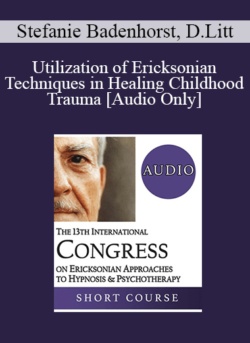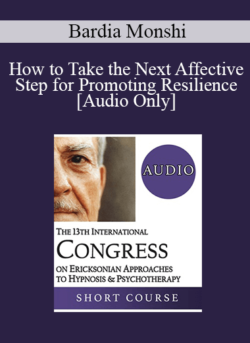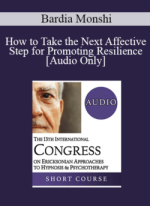[Instant Download] – Immediately deliver the download link after receiving the paymentPurchase [Audio] IC19 Short Course 20 – How to Take the Next Affective Step for Promoting Resilience – Bardia Monshi, PhD courses at here with PRICE $15 $5Topic Areas:Short CourseBundles:IC19 – All AudioCategory:Erickson Congress | Erickson Congress 2019Faculty:Bardia Monshi, PhDDuration:1 Hour 26 MinutesFormat:Audio OnlyOriginal Program Date :Dec 12, 2019:Effective therapy, or coaching, is touching and moving clients. As professionals, we are providing an emotional service because all of our clients’ problems have to do with emotional self-regulation. Therefore, to make therapy effective the impact must be affective!I will first provide an overview of the Person-System-Interactions theory of the personality-researcher Julius Kuhl. It represents a theoretical foundation for thinking about specific ways of self-regulation. Prof. Kuhl defined four interacting subsystems and specific interplays, e.g. the interplay between “self-confrontation & self-calming” or the the interplay between “self-motivation & self-braking”. How a person manages the interplay between these subsystems results in different ego states.Coaching and therapy can be regarded as a service to enhance the client’s affective self-regulation, improving their resilience. That is why secondly we will take a look at resilience from an affective and process-oriented point of view using the PSI-theory. Viennese humor, short movies and case examples will make this course an affective journey, too.On the basis of this knowledge we can:profile our clients concerning access to their different systems of personality,strategically think about the next affective step for our clients and also,figure out which specific method might be best for promoting resilience. Educational Objectives:Define the 4 subsystems of the PSI-Theory.Create a profiling of clients with the PSI-Theory.Utilize the PSI-Theory to plan the next affective step for enhancing resilience.*Sessions may be edited for content and to preserve confidentiality*
 [Audio] IC19 Short Course 24 – Utilization of Ericksonian Techniques in Healing Childhood Trauma: A Case Study of Encopresis – Stefanie Badenhorst, D.Litt
₹830.00
[Audio] IC19 Short Course 24 – Utilization of Ericksonian Techniques in Healing Childhood Trauma: A Case Study of Encopresis – Stefanie Badenhorst, D.Litt
₹830.00
 Intermediate to Advanced Women’s Specialization Program – Jeff Nippard
Intermediate to Advanced Women’s Specialization Program – Jeff Nippard
[Audio] IC19 Short Course 20 – How to Take the Next Affective Step for Promoting Resilience – Bardia Monshi, PhD
₹830.00





